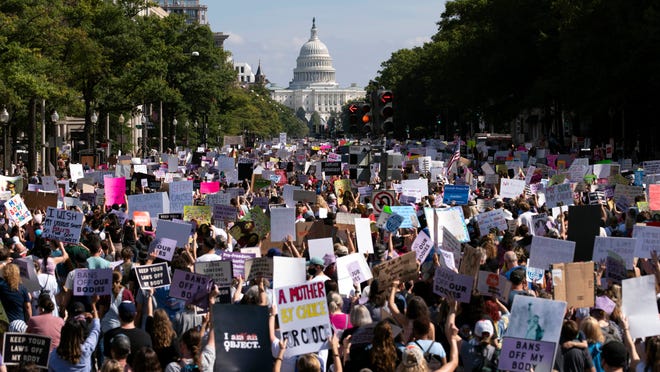

Marching alongside hundreds of others in downtown Milwaukee on Saturday, Summer Van Matre held up a sign that read: “Abortion saved my life.”
Van Matre speaks openly about an assault that led to a pregnancy at 16. She recalls walking to a clinic with her father, knowing she had the support of her parents and was making the right decision.
“I was set not to graduate high school,” she said. “I was set to live a life that was not what I wanted for myself.”
She acknowledged the procedure was not a happy one.
“But I graduated college, I work in finance now with a salaried job and I have good health benefits,” said Matre, from Milwaukee. “I could not have done this without getting an abortion.”
The Milwaukee march in favor of reproductive rights was part of a nationwide series of protests held in cities across the United States.
The demonstrations took place two days before the start of a new term for the U.S. Supreme Court, which will likely decide the future of abortion rights in the United States, after appointments of justices by President Donald Trump strengthened conservative control of the high court.
On Friday, the Biden administration urged a federal judge to block the nation’s most restrictive abortion law, which has banned most abortions in Texas since early September. It’s one of a series of cases that will give the nation’s divided high court occasion to uphold or overrule Roe v. Wade.

“Shame, shame, shame!” marchers chanted while walking past the Trump International Hotel on their way to the steps of the U.S. Supreme Court. Some booed and waived their fists at the Trump landmark.
Elaine Baijal, a 19-year-old student at American University, said her mother told her of coming to a march for legal abortion with her own mother in the 1970s.
“It’s sad that we still have to fight for our right 40 years later,” Baijal said.
The Texas law motivated many of the demonstrators and speakers, in Washington and elsewhere.
More:Wisconsin won’t change its abortion laws now. But it’s on the table depending on the outcome of the 2022 election.
Alexis McGill Johnson, the president of Planned Parenthood nationally, told the Washington crowd that women were forced to drive many hours across state lines – sometimes multiple state lines – to end pregnancies in the weeks since the Texas law went into effect.
“The moment is dark … but that is why we are here,” Johnson said as demonstrators packed into Freedom Square and surrounding streets.
On the West Coast, thousands marched through downtown Los Angeles to a rally in front of City Hall. Protesters chanted “Abortion on demand and without apology: only revolution can make women free!”
Kayla Selsi said she was carrying the same sign she has held in three past Women’s Marches. It stated, “If only my vagina could shoot bullets, it will be less regulated.”
“Unfortunately, I can’t retire this sign,” Selsi said. “Women’s rights are being taken away, and it’s highly affecting women of lower class.”
An opponent of women’s access to abortion called this year’s march “macabre.”
“What about equal rights for unborn women?” tweeted Jeanne Mancini, president of an anti-abortion group called March for Life.
In Milwaukee, marchers chanted “My body, my choice,” and Esperanza Gutierrez kept the rhythm going with a small drum.
“I am here because a woman should have choices and children should deserve to come into a world where they are wanted,” Gutierrez said.
Marty Horning wore a vest that read “Clinic escort.”
For about four years, Horning has helped escort people in and out of abortion clinics.
“We make sure the clients are able to get into the clinic without getting harassed,” he said.
Horning said it was important for him, as a male, to march alongside women in support of reproductive rights.
“I am a son of a mother, I am a father of daughters,” he said. “I come from strong women.”
The Associated Press contributed to this report.
Source link



